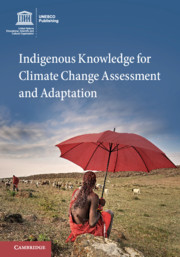Book contents
- Indigenous Knowledge for Climate Change Assessment and Adaptation
- Indigenous Knowledge for Climate Change Assessment and Adaptation
- Copyright page
- Contents
- Contributors
- Foreword
- Acknowledgements
- Abbreviations
- 1 Indigenous Knowledge for Climate Change Assessment and Adaptation: Introduction
- Part I Knowing our Weather and Climate
- Part II Our Changing Homelands
- Part III Confronting Extreme Events
- Part IV Sources of Indigenous Strength and Resilience
- 16 ‘Normal’ Catastrophes or Harbinger of Climate Change? Reindeer-herding Sami Facing Dire Winters in Northern Sweden
- 17 Canaries of Civilization: Small Island Vulnerability, Past Adaptations and Sea-Level Rise
- 18 Peasants of the Amazonian-Andes and their Conversations with Climate Change in the San Martín Region
- 19 Climate Change, Whaling Tradition and Cultural Survival Among the Iñupiat of Arctic Alaska
- 20 Indigenous Knowledge for Climate Change Assessment and Adaptation: Epilogue
- Index
- References
20 - Indigenous Knowledge for Climate Change Assessment and Adaptation: Epilogue
from Part IV - Sources of Indigenous Strength and Resilience
Published online by Cambridge University Press: 13 September 2018
- Indigenous Knowledge for Climate Change Assessment and Adaptation
- Indigenous Knowledge for Climate Change Assessment and Adaptation
- Copyright page
- Contents
- Contributors
- Foreword
- Acknowledgements
- Abbreviations
- 1 Indigenous Knowledge for Climate Change Assessment and Adaptation: Introduction
- Part I Knowing our Weather and Climate
- Part II Our Changing Homelands
- Part III Confronting Extreme Events
- Part IV Sources of Indigenous Strength and Resilience
- 16 ‘Normal’ Catastrophes or Harbinger of Climate Change? Reindeer-herding Sami Facing Dire Winters in Northern Sweden
- 17 Canaries of Civilization: Small Island Vulnerability, Past Adaptations and Sea-Level Rise
- 18 Peasants of the Amazonian-Andes and their Conversations with Climate Change in the San Martín Region
- 19 Climate Change, Whaling Tradition and Cultural Survival Among the Iñupiat of Arctic Alaska
- 20 Indigenous Knowledge for Climate Change Assessment and Adaptation: Epilogue
- Index
- References
- Type
- Chapter
- Information
- Publisher: Cambridge University PressPrint publication year: 2018
References
- 4
- Cited by



